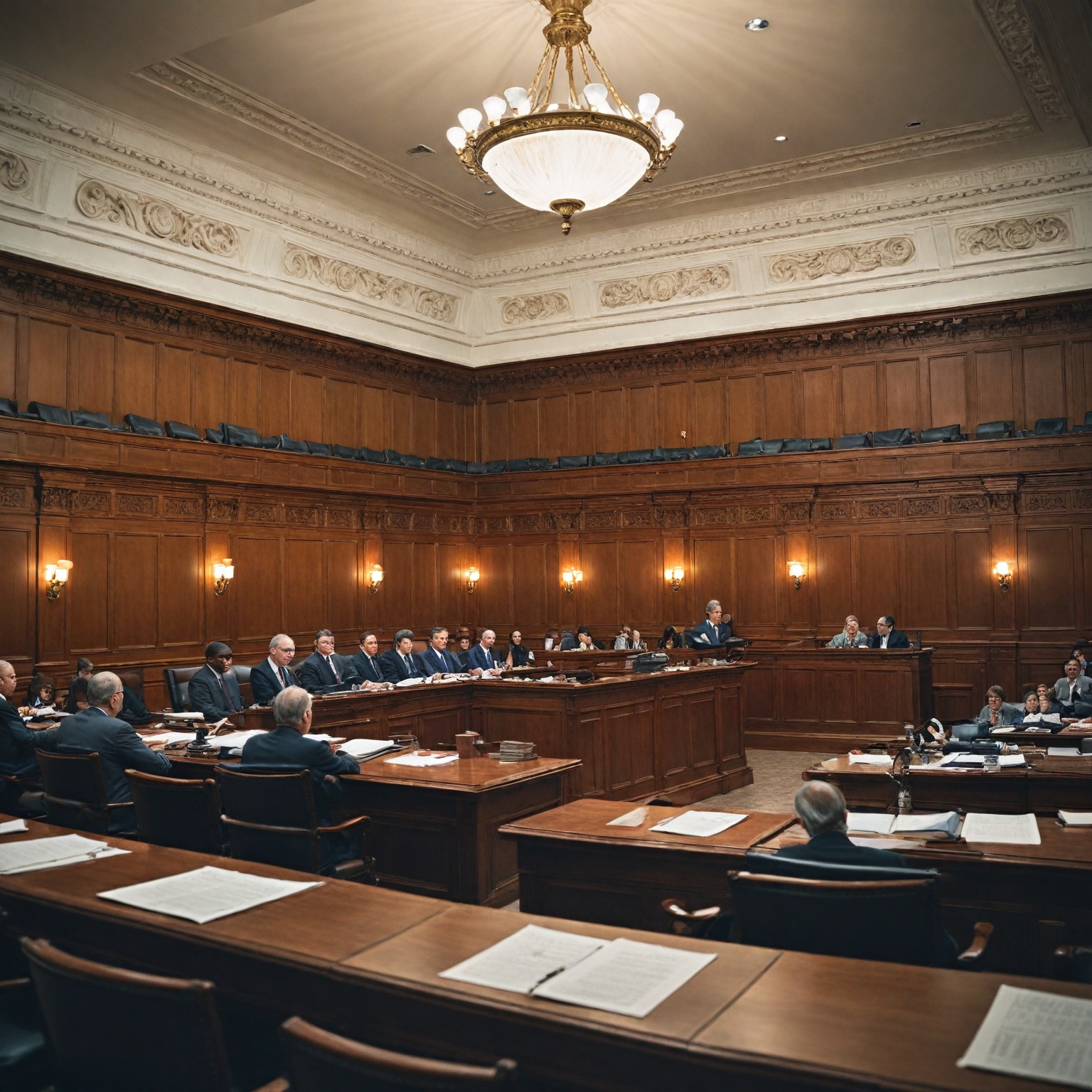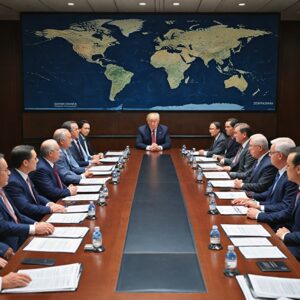Summary
The effort to unseal the grand jury transcripts related to Ghislaine Maxwell’s criminal case attracted significant public and legal attention due to the high-profile nature of her prosecution alongside Jeffrey Epstein for sex trafficking and exploitation of minors. In 2024, the United States Department of Justice (DOJ) filed motions seeking to release these transcripts, arguing that much of the information had already entered the public domain through trial testimony and media coverage, and that disclosure would promote transparency and public understanding of the case. The request also garnered support from some victims and advocates who believed that revealing the grand jury proceedings, with appropriate redactions, could enhance justice and accountability.
However, U.S. District Judge Paul Engelmayer denied the DOJ’s motion to unseal the grand jury materials, emphasizing the long-standing legal principle that grand jury proceedings are presumptively secret under Federal Rule of Criminal Procedure 6(e). In a detailed ruling, the judge found that the transcripts contained little new or substantive information beyond what was already publicly available and described the government’s justification for disclosure as “demonstrably false.” He expressed concern that releasing the transcripts might mislead the public and undermine confidence in the grand jury system’s integrity, noting that the motion appeared motivated more by managing public perception than by genuine transparency.
The decision underscored the judiciary’s cautious approach in balancing the public’s interest in transparency against the traditional protections of grand jury secrecy, which are designed to safeguard witness privacy, encourage candid testimony, and preserve the investigatory process. This case further highlighted complex legal debates about the limited exceptions to grand jury confidentiality, especially in cases of significant public interest, and the challenges in applying those standards to ongoing criminal proceedings.
The denial to unseal Maxwell’s grand jury transcripts provoked mixed reactions from victims, legal experts, and the public. While some victims supported disclosure with protections for privacy, others acknowledged the ruling’s reinforcement of legal norms prioritizing secrecy absent compelling reasons for release. The case has intensified calls for clearer guidelines on grand jury transparency, particularly in historically significant cases involving powerful defendants and systemic abuses.
Background
The effort to unseal the grand jury transcripts related to the Ghislaine Maxwell case arose amid ongoing public and legal interest in the details of the investigation and trial involving Maxwell and Jeffrey Epstein. The Justice Department sought to release these materials, arguing that much of the information contained therein had already been made public through trial testimony or statements from victims and witnesses, and that transparency was important to justice and public understanding of the crimes committed. Attorneys representing key witnesses, such as Annie Farmer, expressed support for the release of the transcripts provided that sensitive information protecting victims and witnesses was redacted.
Under Rule 6(e) of the Federal Rules of Criminal Procedure, grand jury materials are generally kept under strict secrecy, with disclosure limited to specific exceptions. The rules allow government attorneys to share grand jury matters involving foreign intelligence or counterintelligence with federal officials for official duties, subject to strict limitations and court reporting requirements. Moreover, custody of transcripts or recordings is maintained by the government attorney, consistent with established practice. Courts have emphasized that the presumption of secrecy surrounding grand jury proceedings is stringent, requiring a showing that disclosure is necessary to prevent injustice and that the need for openness outweighs the need for secrecy.
The Maxwell grand jury transcripts reportedly do not represent an untapped source of undisclosed information; instead, much of the content overlaps with previously public trial evidence and media reports. Some legal filings highlighted that while certain identities and details remain protected, the government’s motion to unseal was not intended to reveal new allegations beyond those already publicly known. Notably, the transcripts contain testimony referencing prominent individuals allegedly connected to the abuse, but many names were previously disclosed in court documents and media coverage.
Despite the Department of Justice’s petition to release the grand jury materials, a federal judge denied the request, criticizing the government’s justification and stating that the public would gain little new information from the transcripts. The judge described the premise of the motion as “demonstrably false” and expressed concern that the unsealing would mislead the public. This ruling reflects the judiciary’s cautious approach toward balancing grand jury secrecy against demands for transparency in high-profile cases.
Request to Unseal Grand Jury Transcripts
The United States Department of Justice (DOJ) submitted a formal request to two federal judges in New York seeking to unseal the grand jury transcripts related to the investigations of Ghislaine Maxwell and Jeffrey Epstein. The request, made in response to substantial public interest and scrutiny over the handling of the Epstein case, aimed to increase transparency by making these typically confidential documents available to the public. The DOJ characterized the move as a measure to address the intense public blowback and demands for greater disclosure concerning the investigation and prosecution of Maxwell, who is serving a 20-year sentence for sexually exploiting minors.
Despite this appeal, U.S. District Judge Paul Engelmayer denied the motion to unseal the grand jury transcripts in the Maxwell case. In a detailed 31-page opinion, Judge Engelmayer emphasized that there were no special circumstances warranting an exception to the customary secrecy of grand jury materials. He underscored that the public would likely gain no new substantive information from the transcripts, stating that they were not an “untapped mine lode” of revelations about Maxwell, Epstein, or their associates. The judge further criticized the government’s rationale, describing the “abundant public interest” cited as insufficient to meet the threshold for disclosure.
Judge Engelmayer also suggested that the government’s underlying motivation for the unsealing request appeared to be more about managing public perception than promoting genuine transparency. He posited that the move might serve as a diversionary tactic aimed at creating the illusion of disclosure rather than providing meaningful insights, concluding that the public might feel “disappointed and misled” if the transcripts were released. The judge’s ruling thus reinforced the principle that grand jury secrecy remains a critical component of the judicial process unless compelling and exceptional reasons justify otherwise.
The procedural framework governing grand jury material disclosure further complicates such requests. According to federal rules and precedents, including Rule 6(e) of the Federal Rules of Criminal Procedure, grand jury transcripts are generally kept confidential, and their release requires a showing of particularized need or exceptional circumstances. Transfers of grand jury materials between courts are permissible only when the receiving court has direct knowledge of the proceeding necessitating disclosure, and the decision to release lies primarily with the court overseeing the grand jury. Additionally, federal appellate review of grand jury disclosure decisions applies an abuse of discretion standard, reflecting judicial caution in breaching grand jury secrecy.
Judicial Decision to Deny Unsealing
On Monday, U.S. District Judge Paul Engelmayer of the Southern District of New York issued a 31-page ruling denying the Justice Department’s request to unseal grand jury materials related to the criminal case of Ghislaine Maxwell. The Justice Department had argued that the unusual circumstances surrounding the case, coupled with “abundant public interest,” justified the release of the transcripts and exhibits, which are generally protected by grand jury secrecy rules. However, Judge Engelmayer found these arguments insufficient and rejected the motion, emphasizing the long-standing legal principle that grand jury proceedings are traditionally secret and that exceptions to this rule must be strictly justified.
In his decision, Judge Engelmayer characterized the government’s rationale for unsealing the grand jury materials as “demonstrably false” and criticized the Justice Department for the manner in which it pursued the request, particularly noting the exclusion of prosecutors involved in Maxwell’s 2021 trial from the process. The judge noted that the materials would reveal little to no new information beyond what was already publicly known, stating that the transcripts were “redundant of the evidence at Maxwell’s trial” and that the public would likely feel “disappointed and misled” by their release. Engelmayer underscored that there was no substantive “mine lode of undisclosed information” regarding Epstein, Maxwell, or their associates contained within the grand jury materials.
Furthermore, the judge raised concerns about the potential harm to the grand jury system’s integrity, noting that unsealing the transcripts could undermine the confidence of witnesses and the secrecy essential to grand jury proceedings. He also suggested that the government’s motion may have been motivated more by political considerations—to create an appearance of transparency—than by a genuine legal or public interest in disclosure. Engelmayer quoted a 1973 ruling affirming that the policy of maintaining grand jury secrecy “is older than our Nation itself” and reiterated that none of the recognized exceptions permitting disclosure applied in this case.
The ruling reflected the complex legal framework governing grand jury secrecy, which generally prohibits the release of grand jury materials except under narrowly defined circumstances, often requiring a showing of compelling need or evidence of wrongdoing. The decision reinforced the principle that judicial discretion in these matters must balance the public’s right to transparency against the historical and functional necessity of grand jury confidentiality.
Related Judicial History and Precedents
The issue of unsealing grand jury transcripts has been subject to significant judicial scrutiny and complex legal standards. Rule 6(e) of the Federal Rules of Criminal Procedure generally restricts disclosure of grand jury materials, allowing exceptions only under narrowly defined circumstances. Courts have consistently emphasized that defendants cannot challenge the conduct of government attorneys before the grand jury without a preliminary showing of serious misconduct. Additionally, courts retain discretion over how disclosures are handled, such as whether transcripts or electronic recordings are provided, with consideration of the costs and practicability involved.
Historically, courts have recognized that the disclosure of grand jury matters between different federal grand juries is permissible under certain conditions, even without explicit rule provisions, and that attorneys for the government may disclose matters involving foreign intelligence or counterintelligence to appropriate federal officials, subject to strict limitations and court oversight. When grand jury materials are transferred to another court, that court is expected to allow interested parties to be heard before making disclosure determinations, with a preference for the grand jury court to decide such issues.
One notable case addressing the scope of judicial authority to release grand jury transcripts is Pitch. The district court initially held that it had inherent authority to release the transcripts despite the request not fitting within Rule 6(e) exceptions. However, on appeal, the Eleventh Circuit reversed this holding after an en banc rehearing, rejecting the notion of inherent authority to override Rule 6(e) restrictions. This decision not only overruled precedent but also contrasted with other cases where historical significance justified disclosure. The split among circuit courts and the ambiguous legal standards underscore the ongoing need for clarity regarding grand jury record disclosures.
In cases involving high-profile defendants such as Ghislaine Maxwell and Jeffrey Epstein, defense attorneys and the government have debated the applicability of the “historical interest” exception. Maxwell’s lawyers argued that unsealing is generally reserved for cases of historical significance where the parties and witnesses are deceased, whereas the government framed the public interest as “historical,” which Maxwell’s counsel countered was simply intense public curiosity about ongoing proceedings. U.S. District Judge Paul Engelmayer rejected the government’s motion to unseal Maxwell’s grand jury transcripts, finding no special circumstances justified disclosure and stating that the transcripts would not provide meaningful new information beyond what is publicly available. He further noted that much of the grand jury testimony had already been publicly disclosed, except for the identities of certain victims and witnesses.
It is also important to note that disclosure decisions are reviewed under an abuse of discretion standard, and federal grand jury records are exempt from the Freedom of Information Act, preventing public access through FOIA requests. Moreover, in specific contexts such as tax-related cases, additional statutory and regulatory restrictions may apply to grand jury material disclosure, highlighting the complex regulatory framework governing these proceedings.
Reactions and Impact
The decision to deny the unsealing of Ghislaine Maxwell’s grand jury transcripts elicited a range of reactions from legal experts, victims, and public commentators. U.S. District Judge Paul Engelmayer ruled that the transcripts were largely redundant of evidence already presented at trial, and therefore their release would not contribute to public knowledge or transparency in the case. Engelmayer suggested that the government’s motion to unseal may have been motivated more by an attempt to create an illusion of transparency than by a genuine effort to disclose substantive new information. He further noted that individuals deeply interested in the Epstein and Maxwell cases would likely feel misled upon reviewing the materials, as they reveal little beyond what was publicly known.
Victims and their advocates had mixed responses to the ruling. Some victims, including key witnesses such as Annie Farmer, expressed support for the release of grand jury transcripts, provided that sensitive information was redacted to protect privacy and safety. Farmer’s legal counsel emphasized that transparency is critical to justice and the public’s understanding of the full scope of Epstein’s and Maxwell’s crimes, especially given the lasting harm caused to survivors. However, Engelmayer pointed out that many victims’ interest in the transcripts was based on the mistaken belief that the materials would reveal new information, underscoring a disconnect between expectations and reality.
The Department of Justice (DOJ) faced criticism for its handling of the unsealing request. The court highlighted the DOJ’s failure to notify victims in advance of their motion to unseal, a misstep that compounded victims’ frustrations and concerns. Additionally, the timing of the request, which came shortly after the firing of Maurene Comey, one of the last prosecutors involved in the Epstein and Maxwell investigations, raised further questions about the administration’s motives. Some observers viewed the DOJ’s unusual request as part of an effort to mitigate public backlash over the government’s handling of Epstein-related files, though this strategy was met with skepticism by the court.
The ruling also underscored broader legal tensions surrounding the disclosure of grand jury materials. Historically, courts have exercised inherent authority to grant access to grand jury records in cases of significant public interest, such as the Rosenberg espionage case and other historically important investigations. Yet, Judge Engelmayer’s decision reflected the current judicial reluctance to depart from established standards that prioritize grand jury secrecy absent exceptional circumstances. This case has intensified calls for clearer legal guidelines on when and how grand jury records may be disclosed, especially in cases with historical or societal significance.
Broader Legal and Investigative Implications
The refusal to unseal Ghislaine Maxwell’s grand jury transcripts highlights the complex legal framework governing grand jury secrecy and disclosure. Under Federal Rule of Criminal Procedure 6(e), grand jury materials are generally protected to preserve the secrecy of proceedings, with only narrowly defined exceptions permitting disclosure. These exceptions include the ability of government attorneys to share grand jury matters with other federal officials, particularly in cases involving foreign intelligence or counterintelligence, subject to strict limitations and reporting requirements to the court. Additionally, transfers of grand jury materials between federal districts are permissible only when the matter is before a federal court in another district, emphasizing the importance of jurisdictional boundaries in grand jury secrecy.
The case also underscores the judiciary’s careful balancing act between transparency and protecting ongoing legal processes. Courts require that requests to break grand jury secrecy demonstrate a compelling need to prevent injustice in other proceedings, showing that the necessity of disclosure outweighs the traditional need for secrecy and that the request is narrowly tailored to relevant material. This stringent standard is reflected in various appellate decisions, such as the Eleventh Circuit’s reversal of a district court’s release of grand jury transcripts based on the court’s inherent authority, reinforcing that such disclosures must adhere strictly to procedural rules.
Moreover, certain types of cases, including tax-related investigations, are subject to additional statutory and regulatory restrictions on grand jury information sharing, indicating further layers of confidentiality beyond Rule 6(e). The Department of Justice’s efforts to unseal the Epstein and Maxwell grand jury materials, met with judicial resistance, reflect broader tensions between public interest in transparency and legal protections for ongoing investigations and appeals. Maxwell’s opposition to unsealing, largely grounded in concerns about the potential impact on her pending Supreme Court appeal, illustrates how disclosure decisions can significantly affect defendants’ legal strategies and rights.
In assessing the contents of the Maxwell transcripts, some judicial opinions have noted that
The content is provided by Jordan Fields, Fact-Nest













